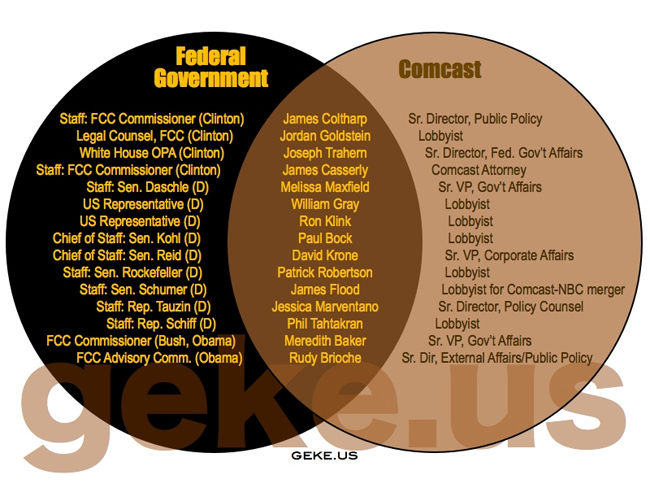
Fast, affordable Internet access for all.

AT&T and Verizon, the dominant telephone companies, want to end their 99-year-old universal service obligation known as "provider of last resort." They say universal landline service is a costly and unfair anachronism that is no longer justified because of a competitive market for voice services. The new rules AT&T and Verizon drafted would enhance profits by letting them serve only the customers they want. Their focus, and that of smaller phone companies that have the same universal service obligation, is on well-populated areas where people can afford profitable packages that combine telephone, Internet and cable television.What happens when the states hand over authority to these companies? David has an answer:
AT&T and Verizon also want to end state authority to resolve customer complaints, saying the market will punish bad behavior. Tell that to Stefanie Brand. Brand is New Jersey's ratepayer advocate whose experience trying to get another kind of service - FiOS - demonstrates what happens when market forces are left to punish behavior, she said. Residents of her apartment building wanted to get wired for the fiber optic service (FiOS) in 2008. Residents said, "We want to see your plans before you start drilling holes, and Verizon said, 'We will drill where we want or else, so we're walking,' and they did," Brand told me. Verizon confirmed that because of the disagreement Brand's building is not wired. And there's nothing Brand can do about it. Verizon reminded me the state Board of Public Utilities no longer has authority to resolve complaints over FiOS.Better broadband is not just about technology.
The Coalition for the New Economy — which works to ensure “that investments in broadband networks are used efficiently and effectively”— wrote Tuesday that “funding for government-owned broadband networks is very often duplicative,” and “diverts local funds from public safety and education. ... Christopher Mitchell of Community Broadband Networks tells the Independent that official U.S. government policy believes “we can have proper competition if every competitor builds their own network, and that is not at all supported by reality.”This group is emphatically supporting less competition because the private sector does not want to overbuild other private networks. If the public is not allowed to build next-generation networks where private companies already operate last-generation networks, communities will have neither modern connections nor real choices. The cable and DSL companies are arguing that no one should be allowed to build public interstates where private dirt roads exist. We live in a democracy. We are supposed to be free to choose the best policies in promoting infrastructure. We can choose a future where we are more dependent on a few absentee massive corporations or one in which we have more control over our future. We can pursue policies that would result in real choices among broadband service providers or we can continue the status quo, where choices dwindle. Below, I have included an excellent debate from last year in which the above points are fleshed out over 2 hours.
We are running a guest commentary today. Eric Null is a third-year law student at Cardozo Law School in New York City. He is passionate about corporate and intellectual property law, as well as technology and telecommunications policy. Follow him @ericnull or check out his papers. While researching a paper about municipal broadband networks, I was struck by the tremendous benefits that municipal networks can provide. It can be the first high-speed Internet link for an area without broadband, or it can provide some much-needed competition in areas that currently have access to broadband, but for some reason that existing access is unsatisfactory (e.g. price, service). Municipalities, in theory, can run the network for the benefit of the public rather than with a vicious profit maximization motive. Indeed, municipal networks bring many benefits. But first, a little history. In the United States, cable providers have set up regional monopolies for themselves, and “competitors” such as DSL and satellite are characterized by slower connection speeds and it is arguable that they are actual substitutes to cable access. Certainly within the cable industry, any “competitive” cable company attempting to compete with incumbents is met with high costs of building new infrastructure and lack of customer base. Municipalities can pick up where smaller, private entities cannot succeed. Municipalities have had a long history of investing in critical infrastructure, and they have the mentality for long-term planning that private companies simply cannot enjoy. A large company like Verizon likely has to justify any expansion of its network to its investors and ensure them that the venture will return a profit relatively quickly. Not so with municipalities; a city network allows its citizens to benefit indirectly (and directly) over the long-term. Thus, city governments can be a formidable competitor in the telecom and cable industries. Some states, regrettably, have banned or restricted the practice. In Nixon v.
In truly competitive markets that display some degree of commodity-like characteristics, large and small vendors tend to coexist. I'm drinking coffee right now, which is a good example. Maybe Maxwell House and Folgers (and their parent companies) have a large share of the market, competing on price for their swill. But there is plenty of room for others to differentiate their product. Dunkin and Starbucks have built huge chains on their own style of semi-premium product, while another couple of niches of premium and superpremium beans are easy enough to find. Food markets tend to be like this; check out any Whole Foods (a/k/a The Museum of Modern Vegetables) for a supply of priced-above-commodity products. I feel foolish for selling most (not all, thankfully) of my Whole Foods stock when it was in the dumps a couple of years ago. The same thing happens in many fields. Apple itself sells computers above commodity price levels. There's a whole "high end" audio business catering to those who like to show off how much they can afford to spend. The automobile industry has mass-market commodity cars and several premium tiers. Internet access in the US lacks that because the natural monopoly on outside plant is not properly regulated. If it were treated here by EU norms, then any number of ISPs could access the wire. Some would just be cheap; some would offer premium help desks among their services. That doesn't happen, however, when the usual number of "competitors" is two. Even more so when those competitors agree that they should divide up markets between themselves rather than overbuild, or (heaven forbid) let outside information providers onto their facilities. The wire should be regulated. ISPs shouldn't.Amen. Physical connections are a natural monopoly. Even if the economics supported many physical providers, having so many would be terribly inefficient. Much better to have networks that are owned by the community and have independent service providers competing to deliver services -- just like the roads.

Broadband infrastructure is this century’s interstate highway system: a public investment in an infrastructure that will rapidly connect Washington’s citizens statewide, nationally, and internationally; fuelling growth, competition, and innovation. Like highway access, the path to universal broadband access varies with the needs of the local community. Our primary goal is to expand broadband access. We believe allowing municipalities and PUDs to provide broadband services addresses the most significant hurdles to broadband expansion: the high cost of infrastructure. In conjunction with a state USF, PUDs and municipalities are well placed to address the needs of their consumers. A secondary goal is to promote a competitive marketplace.
 Reforming this system is a deep, seemingly intractable problem. But for those looking for answers, a good place to start is with the work of Lawrence Lessig. I just finished his Republic, Lost, which offers a grand tour of the problems resulting from the present system of campaign finance.
You can also see a number of his presentations here.
His organization, the Rootstrikers aim to get to the root of problems rather than being distracted by trying to fix symptoms of deeper problems. This is precisely what we do with our focus on community networks.
Many focus solely on resolving digital divide issues, improving rural access to the Internet, lowering the cost of broadband, or the various other problems that result from narrowly-focused private corporations owning and controlling essential communications infrastructure with inadequate regulations.
Reforming this system is a deep, seemingly intractable problem. But for those looking for answers, a good place to start is with the work of Lawrence Lessig. I just finished his Republic, Lost, which offers a grand tour of the problems resulting from the present system of campaign finance.
You can also see a number of his presentations here.
His organization, the Rootstrikers aim to get to the root of problems rather than being distracted by trying to fix symptoms of deeper problems. This is precisely what we do with our focus on community networks.
Many focus solely on resolving digital divide issues, improving rural access to the Internet, lowering the cost of broadband, or the various other problems that result from narrowly-focused private corporations owning and controlling essential communications infrastructure with inadequate regulations. As you read this, remember that the FCC's National Broadband Plan largely places the future of Internet access in the hands of these corporations.
As you read this, remember that the FCC's National Broadband Plan largely places the future of Internet access in the hands of these corporations.“Without the combination, we think the wireless industry will be further weakened by continued hypercompetitive activity, particularly regarding subscriber acquisition costs,” said Nomura Securities analyst Mike McCormack. That means customers can still get lower rates as the industry competes for their dollars. T-Mobile, for example, will continue to be a low-cost competitor, according to consumer advocacy group Consumers Union. A survey showed that data plans from T-Mobile were $15 to $50 less per month than those offered by AT&T.An excellent reminder that what is best for Wall Street is not what is best for the 99%. Big companies like AT&T find competing for customers a hassle that lowers their profits -- they consider a market with four sellers to be hypercompetitive. In wireline, they have acquiesced to the "competition" of two competitors -- cable and DSL. This is one reason communities build their own networks -- the private sector is not truly competitive when it comes to ISPs and most communities have no prospect real of improvement absent a public investment. But we should rejoice in this victory -- because we earned it. Without the hard work of many grassroots groups, it is hard to imagine the Department of Justice or FCC standing up to such a powerful corporation.
I've censored the following, in protest of a bill that gives any corporation and the US government the power to censor the internet--a bill that could pass THIS WEEK. To see the uncensored text, and to stop internet censorship, visit: http://americancensorship.org/posts/15925/uncensor
████████, a █████████████ █████████ ████ ███████ if it ██████ █████ the ████████ in an ██████ to ████ ███████ ████ ████ as ██████ and █████████ ████████████. █████ the ██████ to the ████████ is ███████████, it ████ ██████ █████████ ████ no ██████ on █████ who do not ███████ █████████.